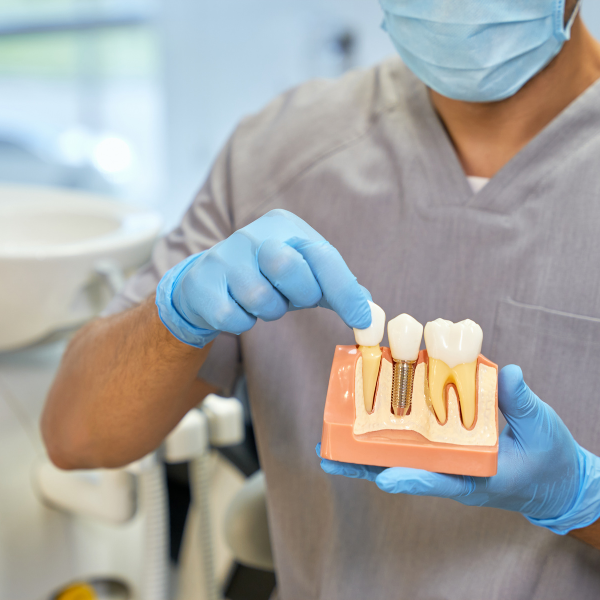Dental implants :
Dental implants are a surgical procedure that aims to replace missing or damaged teeth with artificial teeth called dental implants. Dental implants are a popular solution to improve oral and dental health and the overall appearance of the face. The operation is performed by the oral and facial surgeon and the dentist Specialist in dental implants.
Dental implants begin with evaluating the jaw and teeth to ensure that they accommodate the implant correctly. This is done by performing radiological examinations and examining the mouth and teeth. Then surgery is performed to implant the artificial root in the jaw. The root is left for 3 to 6 months to master From the bonding between the artificial root and the jaw. After which the artificial tooth is fixed on the root. Dental implants need to consider several factors such as the condition of the mouth and teeth, age, and general health of the individual. Dental implants are useful for people who have lost one or more of their teeth due to injury, diseases, or rotting teeth. Dental implants can also be used To install movable teeth or large fractures in the teeth.After surgery, the patient should follow proper care instructions to maintain oral and dental health and help improve recovery faster. This includes:
- Avoid eating hard or soft foods for a certain period.
- Stay away from smoking and alcohol.
- brushing teeth regularly
And visit the dentist regularly.
The basic steps of the dental implant process include:
1- Evaluation and planning: The doctor evaluates the condition of the jaw, bones and teeth adjacent to the place of space, and conducts the necessary examinations and x-rays to ensure the integrity of the jaw and bones. The transplant is then carefully planned using computer and radiography techniques.
2- Surgery: The area where the tooth is to be implanted is cleaned and any remnants of old teeth or damaged bones are removed. The implant is then inserted into the affected jaw, where it is left for a period of time to be absorbed from the bone and well concentrated.
3- Recovery and aftercare: The mouth and jaw need time to recover after the operation. During this period, the patient must take the medications prescribed by the doctor and follow the instructions for wound care and oral hygiene. Once the mouth has fully recovered, The doctor can install the new artificial tooth on the new implant.
After the necessary preparations, the dental implant process is started by making a small cut in the gums and opening a gap in the upper or lower jaw. The implant is placed inside this gap, then the gum is closed above it and fixed with small stitches. The implant is left in place for a period of several months to several weeks to be held in place and merged with the jaw. In the few weeks or months following the procedure, you may need to take anti-inflammatory medications and painkillers to relieve pain and swelling. After the implant is fixed in place, a niche is fixed by placing so-called lenses, pins or screws, The artificial teeth can then be placed over this position. Patients considering having dental implants should talk to their dentist to determine if this is the best option for them. Patients should also consider several factors before undergoing the operation, such as:
- having any other health conditions.
- and age.
- and the quality of the bone in the jaw.
- and artificial teeth required.
- Proper oral and dental care is provided after the procedure.
- In general, dental implants are safe and effective to restore missing teeth and improve the patient’s oral and general health. However, it requires good planning and careful evaluation by the specialist doctor .
After the operation, the instructions of the treating physician must be adhered to and cooperated with to ensure proper recovery and the full success of the operation. Here are some important tips for oral and dental care after dental implants:
1. Adhere to prescribed medications: The doctor may prescribe painkillers and antibiotics to relieve pain and avoid infections. You must strictly follow the doctor’s instructions and take the drug on a regular basis.
2. Drink plenty of fluids: It is recommended to drink plenty of fluids after the procedure to maintain hydration and avoid dehydration.
3. Avoid solid foods: You should avoid eating solid foods during the first days after the operation. It is possible to gradually switch to soft and pureed foods so that the patient can return to his normal diet.
4. Brush teeth gently: Teeth should be brushed gently with a soft toothbrush after the procedure. Electric brushing and strong rinsing are avoided in the first days after the procedure.
5. Pay attention to the operation area: Be careful not to smoke and avoid suction and pressure on the operation area.
6. Rest and relaxation: Strenuous physical activities and sleeping on the side where the tooth was implanted should be avoided in the first days after the operation.
7. Avoid smoking: You should not smoke for a period of time after surgery, as smoking reduces blood flow to the affected area and delays the healing process.
8. Avoid hard foods: Hard and soft foods should be avoided for some time after surgery, specifically during the first day of treatment. It is advisable to eat only soft foods and liquids.
9. Good care of your mouth: You should take good care of the patient’s mouth after treatment, including brushing and paste, and using mouthwash and medical floss to remove food residue.
10.Follow-up with the doctor: The patient must be followed up with the treating doctor regularly after surgery to ensure that the treatment is going properly, and to ensure that the implanted teeth bear the normal functional load of the mouth.
11.Adherence to medical prescriptions: All prescriptions given by the treating physician must be adhered to, including anti-inflammatory drugs, analgesics and antibiotics.

